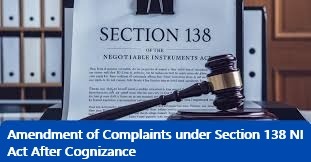AdVocate harshit Sachar | chamber no: 617 | district courts ludhiana | 2817 gurdev nagar ludhiana | ✆+91 7889228369
“Amendment of Complaints under Section 138 NI Act After Cognizance: What Recent Supreme Court Judgment Means”
The Supreme Court allows amendments in cheque bounce complaints even after cognizance, if no prejudice is caused to the accused and the error is curable.
CIVIL LAWSCOMMERCIAL CASE LAWCHEQUE BOUNCE
Advocate Harshit Sachar Ludhiana
9/17/20252 min read


Amendment of Complaints under Section 138 NI Act After Cognizance: What Recent Supreme Court Judgment Means
Cheque bounce cases under Section 138 of the Negotiable Instruments Act often get delayed or dismissed due to technical errors in complaints. Recently, the Supreme Court clarified how certain mistakes can be corrected even after cognizance of the case is taken — a significant development for complainants and accused alike.
What Happened in the Case
In the case of Bansal Milk Chilling Centre vs. Rana Milk Food Pvt. Ltd. & Anr. decided in July 2025, the complainant had filed a cheque dishonour complaint alleging that the respondents had purchased “Desi Ghee (milk products)” but intended to say “milk.” After summons were issued, but before cross-examination of the complainant, an amendment was sought to correct this typographical error. The trial court allowed it, but the High Court had disallowed it, saying the amendment changed the nature of the complaint. The Supreme Court restored the trial court’s order, observing that the change did not alter the essential nature of the complaint and no prejudice would be caused to the accused. Live Law+2SCC Online+2
Key Legal Principles Laid Down
Curable Infirmity / Typographical Error
An amendment is allowed if the issue to be corrected is formal or clerical — something that doesn’t change the essential facts. Law Web+2SCC Online+2No Prejudice to the Accused
The accused must not suffer because of the amendment. If evidence isn’t yet concluded (e.g. before cross-examination), and the change is minor, the court may allow it. Live Law+1After Cognizance also Possible
Previously, many believed amendments couldn’t be done once cognizance was taken. This judgment clarifies they can be, under proper conditions. SCC Online+1Fundamental Nature of the Complaint Must Not Change
If you try to change the date of issuance of the cheque (which might affect limitation or notice period), or change the core allegation, courts may refuse. Lexology+1
Why It Matters
Prevents dismissal of valid cheque bounce complaints over small mistakes.
Helps expedite trials instead of getting stalled in procedural barriers.
Balances fairness: accused aren’t unfairly prejudiced, but complainants get relief for genuine errors.
Precautions & What Complainants Should Keep in Mind
File for amendment as early as possible, ideally before evidence or cross-examination.
Clearly show in the pleading what is being corrected and why.
Show that the mistake is formal (typographical) and not something that changes the essence.
Be ready to address whether the accused is prejudiced (e.g., delays, denial of defence).
Conclusion
This Supreme Court judgment clarifies that in cheque bounce cases under Section 138 NI Act, courts should not strictly deny amendments merely because cognizance has been taken — if the defect is curable and does not prejudice the accused. It fosters justice and avoids denial of remedy due to technicalities.
Disclaimer
This article is for informational purposes only and does not constitute legal advice. For specific cases and actions, legal consultation is necessary.
Services
Sachar Law Firm – Advocate, Lawyer, Attorney & Solicitor Services in India | Ludhiana, Punjab.
Expert legal advice across various practice areas - Civil, Criminal, Divorce and Matrimonial, Consumer and Corporate laws, Bail Matters, Property Contract Disputes, Insurance claim disputes, cyber Crime cases, Cheque bounce, Family Divisions, Arbitration. Bail Matters, Electricity Board Cases, Appeals before Session court Ludhiana, Marriage certificate, Court Marriage, Succession Certificate Accident Claim (MACT), NRI Legal Matters, NRI Property Matters.
“Get in Touch with Sachar Law Firm”
Quick Links
© 2025. All rights reserved.
Advocate Harshit SACHAR
Legal Blog
2817, 1st Floor , Gurdev Nagar, Ludhiana, Punjab -141001
Address: Office Cum Res:
Corporate Liquidation and Recovery Litigation
☎️ 0161 7965410
